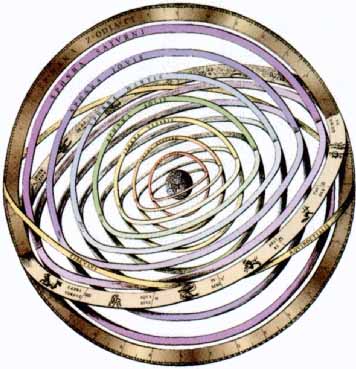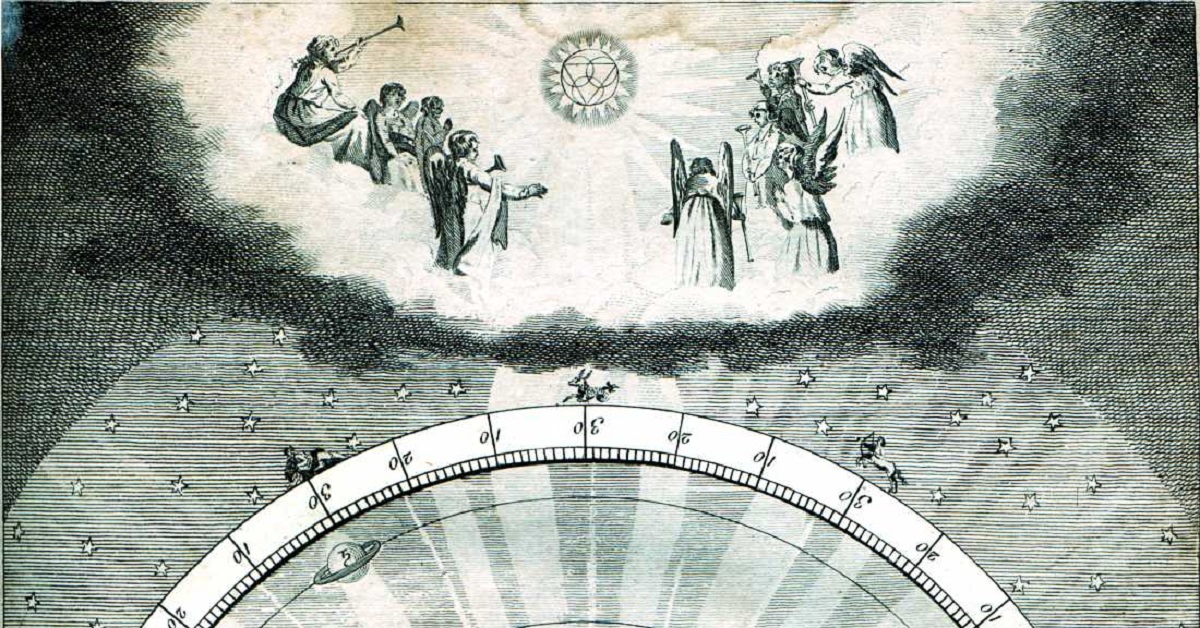Musica Universalis: The Sound Of The Heavens
A long time ago in a galaxy called the Milky Way, on a planet called Earth, there were people who believed the universe was actually a huge musical instrument. How dumb, right? Well, it turned out to be true.
Before we humans got to the point where we were basically aware of what’s going on in space (‘basically’, because there’s still a ton we don’t know, thank god) we used to think our planet was surrounded by celestial spheres, which produced divine music with their movement. While the first is pretty much true, the second didn’t use to be. I know, this is probably confusing but bear with me.
 Sure, until one point it was easy to say ‘haha, those people back then were really stupid to think there’s a connection between the moving of celestial bodies and music’ – but then came science. In the spirit of recent astrophysical discoveries, or, should I say, confirmations, since Einstein thought of gravitational waves a hundred years ago, I’d like to re-ask the following question: What IS music? Why, vibrations, of course. You what vibrates? Matter. What else? Space itself. And by space I don’t mean the darkness you see when you look up at the night sky, no. I mean all space everywhere, the ‘place’ where all matter is, where you are, everything. So yeah, I would say the connection between enormous objects moving around each other (and away from each other, but that’s a topic for an article on astrophysics) is quite obvious for those who understand how a musical instrument actually works. To avoid coming off as condescending, I’d like to explain.
Sure, until one point it was easy to say ‘haha, those people back then were really stupid to think there’s a connection between the moving of celestial bodies and music’ – but then came science. In the spirit of recent astrophysical discoveries, or, should I say, confirmations, since Einstein thought of gravitational waves a hundred years ago, I’d like to re-ask the following question: What IS music? Why, vibrations, of course. You what vibrates? Matter. What else? Space itself. And by space I don’t mean the darkness you see when you look up at the night sky, no. I mean all space everywhere, the ‘place’ where all matter is, where you are, everything. So yeah, I would say the connection between enormous objects moving around each other (and away from each other, but that’s a topic for an article on astrophysics) is quite obvious for those who understand how a musical instrument actually works. To avoid coming off as condescending, I’d like to explain.
The ancients called it Musica universalis or Music of the spheres, or Harmony of the Spheres. It was more a philosophical concept than an actual belief and it stated that celestial bodies such as the Sun, the Moon and the planets (well, the ones we were aware of back then) moved around in specific proportions, thus creating a form of music, seen as the mathematical outcome of their heavenly interrelations. Let’s face it – music is basically math that sounds good. Thank god you don’t have to be good at arithmetic to be able to pull off a killer guitar riff, right?
So, yes, to your disappointment, the music people of ancient times were talking about was not really the music you expect to hear coming from your headphones. It was the idea of divine harmonics, a religious concept if you will, expressed with the language of mathematics. By the way, when I say ‘ancient’, I should really pointy out that the idea of Musica universalis continued to attract the thoughts of thinkers, scholars and even humanists up until the late Renaissance. It was indeed one of those times in history when science blossomed, or maybe ‘exploded’ is a better way to describe the sheer size of what was happening. Discoveries were popping here and there and a bunch of them very conveniently determined some of the physical phenomena created by the orbital motion of celestial bodies, namely orbital resonance.
 This was, I imagine, exciting news for those who had lost all hopes of ever proving there was such a thing as the Harmony of the Spheres. And there were many of them, I presume. But the scientific knowledge of a direct relation between sound and physical dimension had existed ever since Pythagoras figured out that the pitch of a musical note depended on the length of the string producing it. Another basic observation attributed to him is that of the simple numerical ratios formed by the intervals between harmonious frequencies. The Harmony of the Spheres, or the theory that the Sun, the Moon and all planets each emit their own distinctive hum, based on how they revolve in their orbits? Also Pythagoras. Of course, according to the theory, these undetectable hums directly influenced the quality of life on Earth, as it reflected the quality of their celestial sounds. This sounds refreshingly wrong and gives us the rare chance to look down on ancient scholars as if being born a few thousand years later is somehow our own accomplishment. Too bad that, when you really think about it, they were actually right. Of course cosmic vibrations influence our lives. In fact, they do it all the time. Duh, matter IS vibration.
This was, I imagine, exciting news for those who had lost all hopes of ever proving there was such a thing as the Harmony of the Spheres. And there were many of them, I presume. But the scientific knowledge of a direct relation between sound and physical dimension had existed ever since Pythagoras figured out that the pitch of a musical note depended on the length of the string producing it. Another basic observation attributed to him is that of the simple numerical ratios formed by the intervals between harmonious frequencies. The Harmony of the Spheres, or the theory that the Sun, the Moon and all planets each emit their own distinctive hum, based on how they revolve in their orbits? Also Pythagoras. Of course, according to the theory, these undetectable hums directly influenced the quality of life on Earth, as it reflected the quality of their celestial sounds. This sounds refreshingly wrong and gives us the rare chance to look down on ancient scholars as if being born a few thousand years later is somehow our own accomplishment. Too bad that, when you really think about it, they were actually right. Of course cosmic vibrations influence our lives. In fact, they do it all the time. Duh, matter IS vibration.
 Then Plato came and, as if knowing that you and I were going to be bragging about being smart in the future, combined astronomy and music into one twinned definition. They were the studies of sensual recognition. One, astronomy, was meant for the eyes and the other, music, for the ears. Unfortunately for almost any living musician today, they both required an understanding of numerical proportions.
Then Plato came and, as if knowing that you and I were going to be bragging about being smart in the future, combined astronomy and music into one twinned definition. They were the studies of sensual recognition. One, astronomy, was meant for the eyes and the other, music, for the ears. Unfortunately for almost any living musician today, they both required an understanding of numerical proportions.
Any serious text concerning ancient thought on practically any subject sooner or later arrives at Aristotle. Here’s what he said about the Harmony of the Spheres:
“We should see evidently, after all that proceedes, that, when they talk to us about a harmony resultant of the movement of those bodies, same as the harmony of the sounds that are entwined, there is brilliant comparison being done undoubtedly, but vain; that is not the truth nowise. There are indeed people [the pythagoreans] that figures out that the movement of bodies so big (the planets) must produce necessarily noise, because we hear all around us the noises that bodies without mass nor a speed as equal as the Sun of the Moon.
 Because of that, one believes being authorized to conclude that stars so numerous and immense cannot go by there making translations moves without making any intense noise. Admitting at first this hypothesis, and supposing that these bodies, thanks to its respective distances, they are for its speed in the same proportion than harmonies, this philosophers come to pretend that the star’s voice, which moves into circles, is harmonious. But as it would be very surprising that we did not hear that pretentious voice, it explain us the cause, saying that noise is in our ears since our birth date. This causes that we cannot tell the noise, the thing is, we have never had the contrast of silence which would be its opposite: because voice and silence make themselves distinguishable the one to the other”.
Because of that, one believes being authorized to conclude that stars so numerous and immense cannot go by there making translations moves without making any intense noise. Admitting at first this hypothesis, and supposing that these bodies, thanks to its respective distances, they are for its speed in the same proportion than harmonies, this philosophers come to pretend that the star’s voice, which moves into circles, is harmonious. But as it would be very surprising that we did not hear that pretentious voice, it explain us the cause, saying that noise is in our ears since our birth date. This causes that we cannot tell the noise, the thing is, we have never had the contrast of silence which would be its opposite: because voice and silence make themselves distinguishable the one to the other”.
Right, as I’m sure you’re a bit confused, just as am I every time I read Aristotle, I’ll try to jam all we’ve said so far in a tiny, one-sentence, takeaway bag:
The Music of the Spheres is a beautiful metaphysical concept, which states that the ‘tones’ created by the motion of celestial bodies can be seen as music and expressed as mathematical relationships, using numbers, shapes and sounds, all following a divine pattern of proportion.
I feel like we may need to start sounding less abstract. In our next article we’ll see how modern science used satellites and observations of the Earth’s magnetosphere to unintentionally prove the we, indeed, live in a giant musical instrument. Stay tuned! 🙂
Meanwhile, head over to Drooble for more interesting facts about music and tons of exciting people from all over the world!




